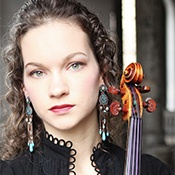On Dec. 3, concertgoers at Walt Disney Concert Hall arrived expecting a concert conducted by guest conductor Miguel Harth-Bedoya, but discovered on the program insert that he had to cancel due to illness and was being replaced by the young American conductor and LA Phil Dudamel Conducting Fellow Jonathon Heyward. The program, which was originally scheduled to include the Rachmaninoff Symphony No. 3 was also changed to include the Ruslan and Ludmilla Overture by Glinka and The Firebird Suite (1919 version) by Stravinsky. Two works originally scheduled, Ser (Being) by Tania León and Bernstein’s Serenade (after Plato’s “Symposium”) with violinist Hilary Hahn as soloist, were retained.
Heyward woke the audience up with the Ruslan and Ludmilla Overture, a rollicking piece which, depending on how fast the conductor takes it, is a challenge for the string players. It was, of course, no problem for the able fingers of the LA Phi’s string sections, and was a good warm-up piece for the young Heyward.
Heyward taking over at the last minute for the ailing Harth-Bedoya reminds one of Bernstein taking over the New York Philharmonic at the last minute for the ailing Bruno Walter. That propitious debut, which was broadcast on CBS radio all over the country, catapulted Bernstein into the American psyche and garnered him instant fame. Heyward’s substitution for Harth-Bedoya won’t have the same effect for many reasons, but it did introduce him to LA audiences and showcased his fine, but still developing, conducting skills.
Bernstein began a personal relationship with the LA Phil in 1982 when, along with Ernest Fleischman, he founded the Los Angeles Philharmonic Institute, where he served as artistic director and conductor until 1984. He also recorded with the LA Phil during that time. The year 2019 is the centennial of Bernstein’s birth and many orchestras and other music ensembles are celebrating it. The LA Phil is no exception.
The Serenade is scored for strings, harp and percussion, an interesting combination that Bernstein uses effectively along with the solo violin. Some might refer to it as a violin concerto, but it’s a violin concerto like Berlioz’s Harold in Italy is a viola concerto; in other words, not really, even though the violin does have a prominent role. Most of the time, however, it is accompanying or accompanied by the orchestra. On Sunday, Hahn sacrificed the flashy playing in a Mendelssohn or Tchaikovsky concerto, for the musical fruits of the Serenade, and all were richly rewarded. She has a strong affinity for the LA Phil and could be seen looking over at the Phil’s concertmaster, Martin Chalifour, and smiling as they played. And at the conclusion, she applauded for the orchestra as they applauded for her. And she made sure to acknowledge Heyward’s graceful and sensitive reading of the piece, especially on such short notice.
Hahn graced the audience with a brief encore — the Gigue from Bach’s Partita No. 3 in E Major, BWV 1006. The solo works for violin by Bach really show a soloist’s mettle, and even this brief piece allowed Hahn to show off her skills.
The second half began with a world premiere and LA Phil commissioned work, Ser (Being), by Cuban-born American composer Tania León. Using the full force of a large orchestra, León paints a musical picture dedicated “to my ancestors,” which starts with a chirping clarinet played over quiet harmonics in the strings and in a brief 10 minutes traverses a landscape of musical free-association before it returns to the quiet of the introduction. Heyward couldn’t have had much time to prepare, but he conducted it as if he had studied the piece at length.
Heyward concluded the concert smartly with the ever-popular Firebird Suite by Stravinsky, which assuaged the disappointment, at least by this reviewer, at not hearing the Rachmaninoff third symphony. Stravinsky wrote the Firebird when another composer pulled out of the project and Sergei Diaghilev offered the job to the 28-year-old Stravinsky. The rest, as they say, is history. The 1919 suite pulls the most melodic and dynamic parts from the entire score together for a sonic feast showcasing Stravinsky’s talent for orchestration.
Heyward and the Phil played Stravinsky’s gem straight, allowing the music to speak for itself and the orchestra to do what it does best: play exquisitely. A shout-out to Principal Bassoonist Whitney Crocker for his sensitive playing.
Like Bernstein and Stravinsky each in his own way, Heyward stepped in at the last minute and rose admirably to the task. In so doing, he introduced himself to the LA audience who will definitely want to watch his development.
—Henry Schlinger, Culture Spot LA
Visit www.laphil.com.







